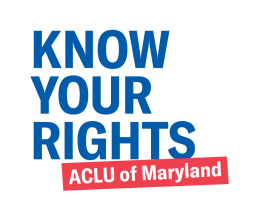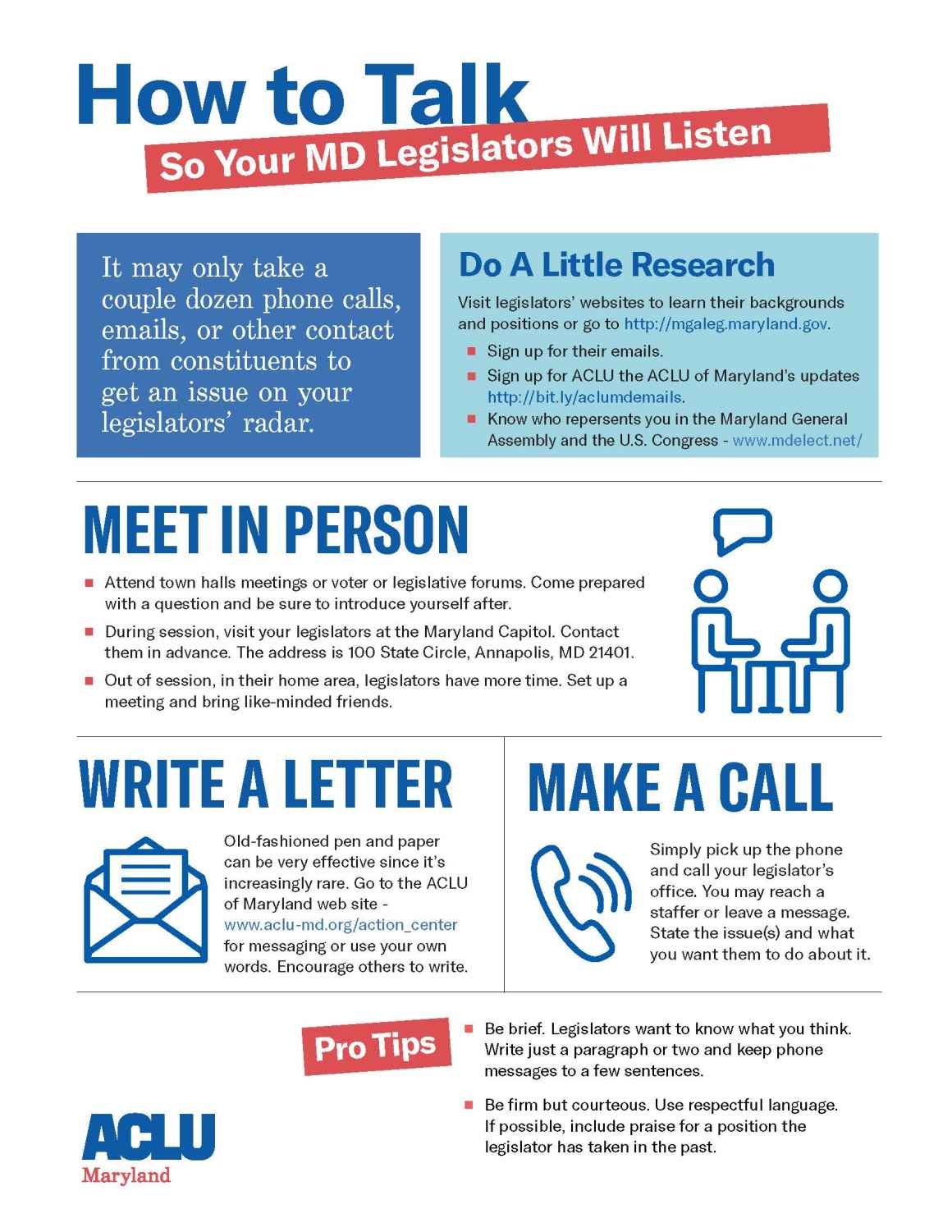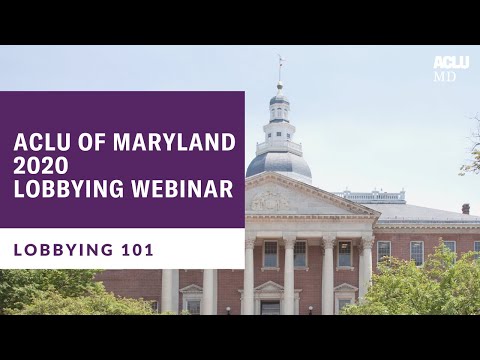
Do you know who your elected officials are?

Meet with Your Elected Officials
From your local city council to your Senators in Washington, meeting with your elected officials about civil liberties issues is a lot easier than most people think. Remember, your legislators work for you!
What is a lobby visit?
A lobby visit is merely a meeting for you to tell your elected representative what you think about a certain issue or bill, and to try to get him or her to take action on that issue.
Where can you meet?
It's not necessary to travel to Washington, DC - every Member of Congress also has one or more offices in their congressional district. Even though the Member is not in the local office(s) very much, there is a permanent staff member at each office with whom you can meet.
Request Your Meeting
- Make your request in writing and follow up with a call to the Appointment Secretary/Scheduler.
- Suggest specific times and dates for your meeting.
- Let them know what issue and legislation (by bill number, if it has one) you wish to discuss.
- Make sure they know that you are a constituent.
Prepare for Your Meeting
- Call ACLU for materials. We should have information to help you decide on your talking points, as well as materials that you can leave with your elected official.
- Decide who will attend the meeting. Bringing more than four or five people can be hard to manage. Keep it small, but bring people who represent different groups that have an interest in the legislation like doctors, veterans, religious leaders, school board members, etc.
- Agree on talking points. It's tough to make a strong case for your position when you are disagreeing in the meeting! If a point is causing tension in the group, leave it out.
- Plan out your meeting. People can get nervous in a meeting, and time is limited. Be sure that you lay out the meeting beforehand, including who will start the conversation.
- Decide what you want achieve. What is it you want your elected official to do - vote for or against the bill? Make a commitment to introduce or co-sponsor legislation? Asking your legislator or his or her staff member to do something specific will help you know how successful your visit has been!
During the Meeting
- Be prompt and patient. Elected officials run on very tight schedules. Be sure to show up on time for your appointment, and be patient - it is not uncommon for legislators to be late or to have your meeting interrupted by other business.
- Keep it short and focused! You will have twenty minutes or less with a staff person, and as little as ten minutes if you meet with your elected official. Make the most of that brief time by sticking to your topic.
- Bring up any personal, professional or political connections to the elected official that you may have. Start the meeting by introducing yourselves and thanking the legislator for any votes he or she has made in support of your issues, and for taking the time to meet with you.
- Stick to your talking points! Stay on topic, and back them up with no more than five pages of materials that you can leave with your elected official.
- Provide personal and local examples of the impact of the legislation. This is the most important thing you can do in a lobby visit.
- Saying "I don't know" can be a smart political move. You need not be an expert on the topic you are discussing. If you don't know the answer to a question, it is fine to tell your legislator that you will get that information for him or her. This gives you the chance to put your strongest arguments into their files, and allows you to contact them again about the issue. Never make up an answer to a question - giving wrong or inaccurate information can seriously damage your credibility!
- Set deadlines for a response. Often, if an elected official hasn't taken a position on legislation, they will not commit to one in the middle of a meeting. If he or she has to think about it, or if you are meeting with a staff member, ask when you should check back in to find out what your legislator intends to do about your request. If you need to get information to your legislator, set a clear timeline for when this will happen. That way, you aren't left hanging indefinitely.
After the Meeting
- Right after the meeting, compare notes with everyone in your group to compare what the elected official committed to do and what follow up information you committed to send.
- Each person who took part in the meeting should promptly send a personal thank you letter to the Congress member.
- Follow up in a timely fashion with any requested materials and information.
- If the elected official or staff member doesn't meet the deadline for action you agreed to during the meeting, ask him or her to set another deadline. Be persistent and flexible!
- If you are meeting with a member of Congress, let the field department at the ACLU know what you learned during your meeting by sending an e-mail to aclu@aclu-md.org. Knowing what arguments your Congress member used, what issues are important to him or her, and what positions he or she took will help us make our national lobbying strategy more effective!
Remember that a personal meeting with your member of Congress is one of the best opportunities to demonstrate that there is a constituency for civil liberties in your district.
Tips on Writing to Your Elected Officials
Letters and faxes are an extremely effective way of communicating with your elected officials. Many legislators believe that a letter represents not only the position of the writer but also many other constituents who did not take the time to write.
These tips will help increase the effectiveness of your letter:
- Keep it brief: Letters should never be longer than one page, and should be limited to one issue. Legislative aides read many letters on many issues in a day, so your letter should be as concise as possible.
- Say up front who you are and what you want: In the first paragraph, tell your legislators that you are a constituent and identify the issue about which you are writing. If your letters pertains to a specific piece of legislation, it helps to identify it by its bill number (e.g. H.R. ____ or S. _____).
- Hit your three most important points: Choose the three strongest points that will be most effective in persuading legislators to support your position and flesh them out.
- Personalize your letter: Tell your elected official why this legislation matters in his community or state. If you have one, include a personal story that shows how this issue affects you and your family. A constituent's personal stories can be the very persuasive as your legislator shapes his or her position.
- Personalize your relationship: Have you ever voted for this elected official? Have you ever contributed time or money to his or her campaign? Are you familiar with her through any business or personal relationship? If so, tell your elected official or his staff person. The closer your legislator feels to you, the more powerful your argument is likely to be.
- You are the expert: Remember that your legislator's job is to represent you. You should be courteous and to the point, but don't be afraid to take a firm position. Remember that often your elected official may know no more about a given issue than you do.
You can get the contact information for your Members of Congress here.
ACLU of Maryland - Lobbying 101
Recorded on Feburary 3, 2020

